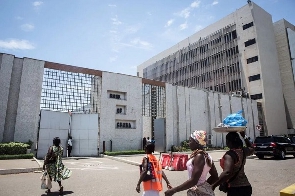 The Bank of Ghana Headquarters
The Bank of Ghana Headquarters
Director of Research at the Institute of Economic Affairs (IEA), Dr John Kwakye has reiterated his stance against the Central Bank’s use of a demand-based Inflation Targeting (IT) framework to tackle inflationary pressures.
According to him, this exclusive use of the IT framework by the Central Bank has generally been ineffective in taming inflation which has strong supply and cost undercurrents.
In December 2022, Ghana’s inflation soared to about 54% percent, making it the highest recorded in three decades. Currently, the figure for Ghana’s inflation is pegged at 38.1% for September 2023.
In a statement issued ahead of the 2024 budget statement, the IEA Director of Research pointed out that while the Bank of Ghana has primary responsibility for price stability, it is obliged to support the general economic policy of the government.
“The fight against inflation should be a coordinated effort between the Bank of Ghana and Government, which has overall responsibility for the management of the economy. The effort to tackle inflation should ensure that the IT framework is supplemented by measures targeted directly to the supply/cost factors, particularly food prices, fuel prices and the exchange rate,” Dr Kwakye noted.
The IEA however said it expects the 2024 budget to signal a clear path to taming inflation on a durable basis and thereby reducing its associated economic hardships on citizens.
MA/NOQ
Ghana’s leading digital news platform, GhanaWeb, in conjunction with the Korle-Bu Teaching Hospital, is embarking on an aggressive campaign which is geared towards ensuring that parliament passes comprehensive legislation to guide organ harvesting, organ donation, and organ transplantation in the country.